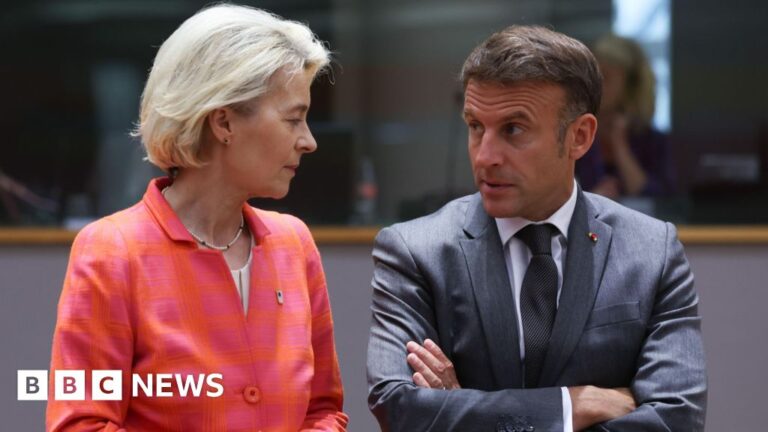Image source, EPA-EFE/REX/Shutterstock
- author, Bethany Bell
- role, BBC News in Brussels
-
At a summit in Brussels, EU leaders nominated current European Commission President Ursula von der Leyen for a second five-year term as head of the bloc.
Estonian Prime Minister Kaja Kallas has been selected as the EU’s next foreign affairs chief, while former Portuguese Prime Minister António Costa has been chosen as the next president of the Council of EU Leaders.
All three candidates are from centrist, pro-EU backgrounds.
The European Parliament is due to vote on the nominations of von der Leyen and Kallas.
Von der Leyen is a centre-right German leader, Costa a socialist and Kallas a liberal.
The leadership package signals continuity for the EU at a time of geopolitical uncertainty. It comes despite a surge in support for far-right parties in European Parliament elections earlier this month.
But Italian Prime Minister Giorgia Meloni is resisting.
Speaking before the summit, she said the plan ignored the success of far-right parties such as her own in recent European Parliament elections.
Meloni has sought to build a constructive relationship with mainstream EU politics but abstained from voting for von der Leyen and against Costa and Kallas.
It was notable that Meloni, who leads the European Conservatives and Reformists (ECR) coalition on the right of the European Parliament, was not included in the nomination consultations, even though the ECR became the third largest party in Parliament after the European elections.
Speaking to the Italian parliament on Wednesday, she said angrily that European voters were asking the EU to take “a different path from the one we have been on so far.”
Without naming names, she criticised “those who claim that the public is not mature enough to make certain decisions”. [who believe] “Oligarchy is essentially the only acceptable form of democracy.”
Getting approval from the European Parliament could be a tougher challenge.
Ms von der Leyen needs 361 votes to be confirmed for a second term – in theory the support of the centre-right European People’s Party, the Liberal Party and the Social Democrats should be enough, but the margin is slim.
Diplomats say von der Leyen may be trying to win Meloni’s support by giving Italy a powerful post in the European Commission.
“I would like to express my sincere gratitude to the leaders for approving my nomination for a second term as President of the European Commission,” von der Leyen said.
If confirmed by the European Parliament, one of her main tasks will be to determine how the EU can continue to support Ukraine in its fight against Russia, although this could be complicated if Donald Trump wins the US presidential election in November.
Karas is also a strong supporter of Ukraine and a vocal critic of the Kremlin and Russian President Vladimir Putin.
The Moscow government put her on a wanted list after removing a Soviet-era war memorial.
Some critics have expressed concern that her uncompromising stance could hinder her new role as the EU’s top diplomat, both within the bloc and beyond.
“I’m truly honored to help,” Callas said, describing the role as a “great responsibility.”
“My goal is definitely to work for European unity and to defend European interests.”
Costa praised both Kallas and von der Leyen, saying he was “convinced that our cooperation will be very successful for Europe and European citizens.”
“Obviously, Europe and the world are facing difficult times,” he said after his nomination.
“But the European Union has always found strength in unity and has demonstrated its resilience. Building unity among Member States will be my top priority when I take up my post in December, and I will be focused on keeping on track the strategic agenda approved today by the European Council.”

